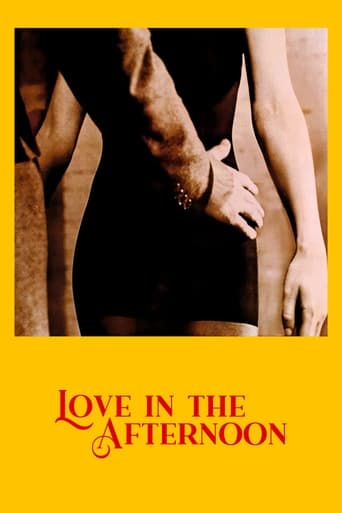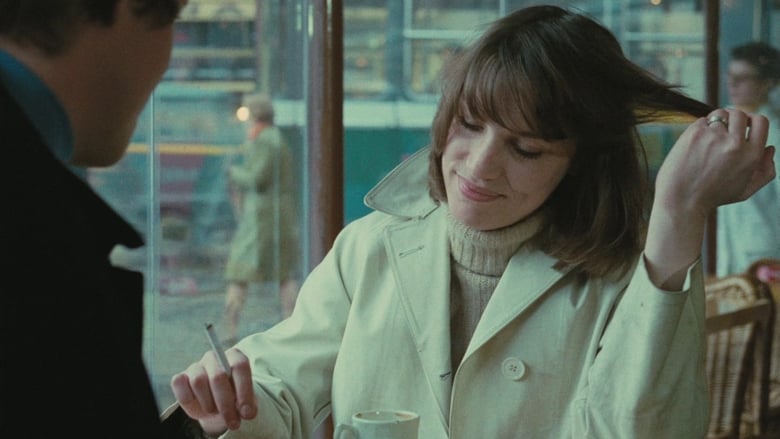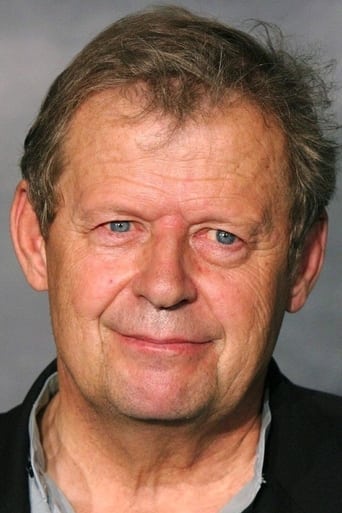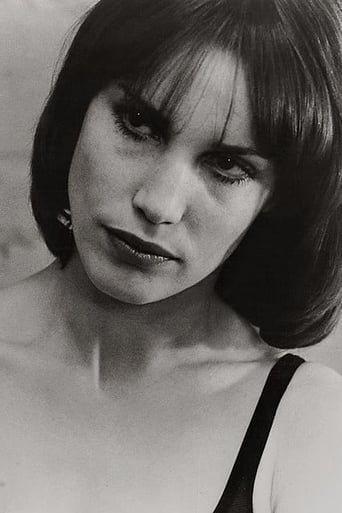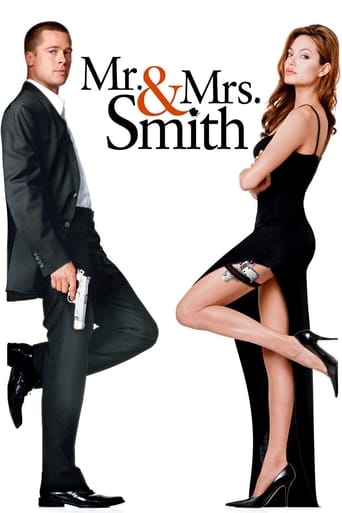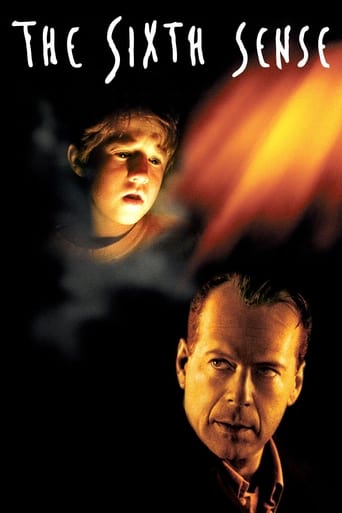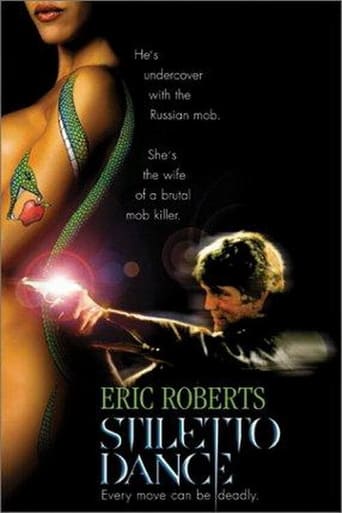Love in the Afternoon (1972)
The last of Rohmer's Six Moral Tales. Frederic leads a bourgeois life; he is a partner in a small Paris office and is happily married to Helene, a teacher expecting her second child. In the afternoons, Frederic daydreams about other women, but has no intention of taking any action. One day, Chloe, who had been a mistress of an old friend, begins dropping by his office. They meet as friends, irregularly in the afternoons, till eventually Chloe decides to seduce Frederic, causing him a moral dilemma.
Watch Trailer
Cast


Similar titles
Reviews
One of the most extraordinary films you will see this year. Take that as you want.
There's no way I can possibly love it entirely but I just think its ridiculously bad, but enjoyable at the same time.
A terrific literary drama and character piece that shows how the process of creating art can be seen differently by those doing it and those looking at it from the outside.
It's a feast for the eyes. But what really makes this dramedy work is the acting.
Like all Rohmer's films I've seen, this one is "just" a story, told as by a storyteller, without any of the visual cinematic items that usually make of a film a "movie". The only "special effects", here, are visual, and consist of beautiful women...So, it's the story that I will comment on.For me, the story is the genesis of an avalanche, the explanation of how you can get from A to Z, where Z is so far away from A that you really need to pass through all the intermediate steps: an avalanche that gains, slowly, speed, as you move gently from A to B, C, D, and than, a little more unexpectedly, to E, F, G. down to all the furthest and most extreme letters of the alphabet.No, not the Z, though.It is extremely difficult to imagine how, or why, a happy man, with one child and another coming, and a beautiful wife, would want to make pregnant an old friend of his, who has no intention - or so she says - of having a lasting or meaningful relationship with him.Here the intermediate letters of the alphabet consist of the reappearance of an old friend, of a mild crisis of a man who was accustomed and able to choose beautiful women and that now "only" has his wife, of a sort of boredom that appears in his empty (although business-filled) afternoons, and of course of the challenge that all this comports. Step by step, although improbable, he is taken almost down to the most extreme consequence, until he remembers of being a proud father, in the most beautifully (and perhaps only) cinematic act of the film, while he pulls out his jumper, and by doing so he remembers of a playful day at home. Yes, home, that sacred thing that he manages, finally, to save and preserve from that avalanche that ran over his afternoons.Marco
Eric Rohmer directed the last of his "Six Moral Tales" in 1972 with a simplicity that would put off viewers today.People expecting a swelling score, dramatic moments, flashy, tricky editing, glamorous stars, and a satisfying conclusion will probably be best to look elsewhere as this, the plainest (yet not without its subtexts) of his films, depicts a flirtation with the opposite sex in a Walter Mitty fashion at its beginning which out of the blue becomes real in the form of Chloe (Zouzou) as she pays a visit to Frederic (Bernard Verley) at his office one afternoon. Both reconnect in conversations, but while she seems slightly aggressive -- the ultimate fantasy of any male -- and worldly, he seems to dance tentatively around her, as if coming too close might not be a wise idea. Frederic's pregnant wife Helene (Francoise Verley) is kept aside in an apparent blissful ignorance that anything may be going on between he and Chloe even when they all converge one evening in a Macy's-like department store. It makes you wonder if Eric Rohmer is trying to tell you if he's giving the green light on this possibility, that Frederic will indeed, later on, give in to Chloe's aggressive, almost masculine advances. (An interesting contrast is presented with having Helene look frail, waif-ish, ultra-feminine, while Chloe is clearly the opposite: a little world-weary, tomboy-ish at times, plain yet intriguing, with an aura of the equivalent of today's Angelina Jolie within.) It is this flirting with what is clearly on the outside of his structured life the reason that makes Frederic accept her advances, and even feel slightly piqued when soon after taking a part-time job as a waitress in a restaurant she suddenly disappears for about two weeks without notice. When she does return, though, she seems determined to have Frederic's child -- at least, this is what she states, even though Helene has borne him two, one during the course of the story -- but of course, since she's an independent woman who can love from afar and not feel the constraints of marriage, she would never impose anything on Frederic.Is she real, or is she also dancing in her own oblique yet frank dance? One can never be too sure: she states not wanting any emotional attachments on one end yet clearly reacts to Frederic's repeated telling her he is married.And then there's the question in regards to Helene, whom we only see sparingly throughout the film: through Chloe's words, how much does she hide from Frederic? How well do we know even our closest ones? Might Helene also have someone, her own secrets? Chloe states she's recently seen her walking with a man on the streets of Paris, but since we never do, we can only speculate. Yet this becomes important only minutes later, as when Frederic, who is coming extremely close to making love to Chloe (who for the moment seems to have gotten her life in order as a shopgirl), decides to leave her naked on her bed after visiting her while she was showering and run back to his office and into the waiting Helene who needs to see him at once. Why, it is never explained. Rohmer decides to leave it open to discussion as the credits pop up, and apparently, a 'happy ending' has been reached through Helene's emotional outburst, and their embrace an decision to make love at the very end.
This is not a film made in a traditional fashion; it shows that men may have some thoughts even at 50s. If you are working in areas where you have to treat public, certainly you will find ladies (or men, vice versa for women) whom you may like certainly, and attraction sometimes is fatal for certain families. Here there is no violence just the desire of a single woman to be with a married man and the way the latter reacts and finishes this relationship together with the attitude of his wife. She may seem passive, but is not, she suspected a lot until the man declares love again for her wife.
Veteran French actor Bernard Verley stars as Frederic who is the kind of man who loves women with a great passion, but finds that he can direct all that love physically into one woman. Chloe is a woman, cynical about men, confident of her power of seduction, a woman who never wants to marry. They were friends and now they meet again. He is married, a successful businessman. She is single, living from day to day. What will happen? Will she entice him away from his wife? Will he find the French happiness with a wife and a mistress? The title, while good, is misleading, as is the sexy cover on this video. (The French title, L'amour l'apres-midi, is better; but that title in English was taken by Love in the Afternoon (1957) starring Gary Cooper and Audrey Hepburn.) This is about as sexy as a Disney movie (although there is some backside nudity), yet it is an intriguing story about love, human sexuality and the question of monogamy. I can already see some of the other reviews: "Too talky." "Endless talk and no action." Ah, but they are wrong. This is a fascinating film in which the action is subtle and true and very interesting.Francoise Verley plays Frederic's wife. She is not nearly as pretty as he thinks she is. Nor is she as removed from his life away from her as he naively believes. Eric Rohmer's subtle direction makes it clear that she knows more than she will ever tell him, that she loves him and perhaps prays that he still loves her. But she is above saying a single word. One gets the sense that she knows he is a man so attractive to other women that it is inevitable that he will stray. But does he? The final scene in which we know why she is crying--although ironically, he does not--is just beautifully done and ends the movie at exactly the right moment.Zouzou plays Chloe who is Parisian, bohemian and quietly desperate. As usual with Rohmer there is a kind of realism in the movie that defies description. The people and the scenes and the events are real; there is no straining for effect, and everything is understated with a characteristic Rohmerian message about human nature.This starts slow and never really speeds up, but do yourself a favor and stay with it. The denouement is beautifully turned and the revelation of the three principal characters is as clear and clean and agreeable as Chloe after her shower.(Note: Over 500 of my movie reviews are now available in my book "Cut to the Chaise Lounge or I Can't Believe I Swallowed the Remote!" Get it at Amazon!)

